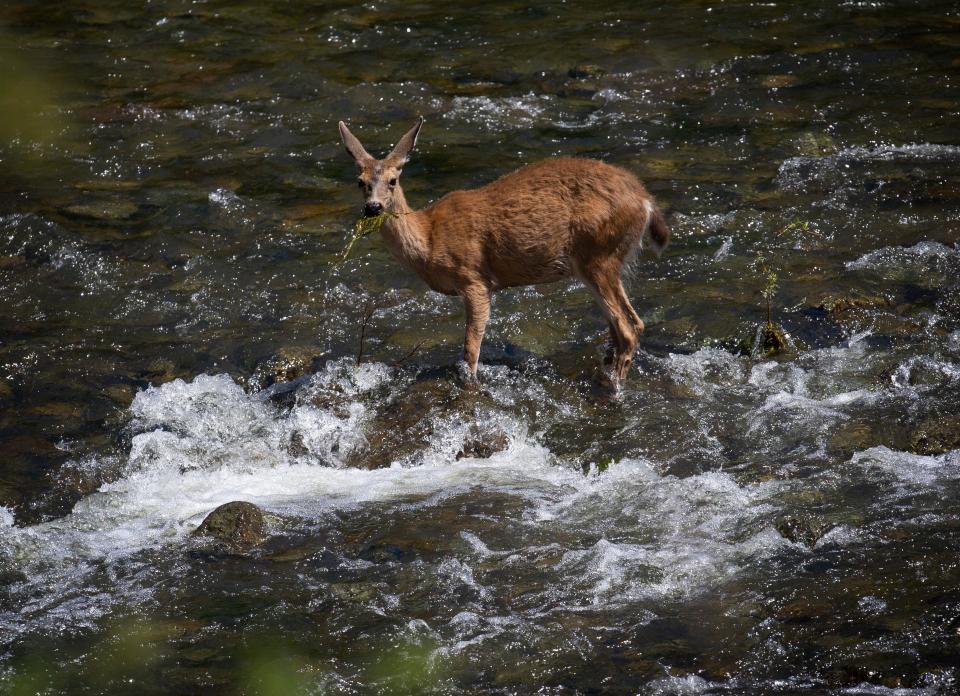CDFW mailbag: Poachers can lose license, why there are so many salmon in the Bay Area
Q: Why are so many salmon showing up in Bay Area rivers and streams?
A: CDFW fisheries staff can confirm that hundreds of salmon — many of them Chinook — have been spotted over the past few months in Bay Area streams and rivers, especially in the East Bay.
Chinook salmon stray for a lot of reasons, including natural repopulation strategies, lack of attraction flows coming from natal streams, release location and large attraction flows at the right time of year.
This fall, we had substantial early rain that coincided with the adult fall-run migration back into freshwater. This helped attract salmon to these areas. Salmon may attempt to spawn in these streams, but because they don't have sufficient year-round stream flows they can’t maintain a run.
Due to poor environmental conditions in the Central Valley rivers and Delta, the California Department of Fish and Wildlife trucks millions of juvenile salmon to the San Pablo, San Francisco and Monterey bays to help increase their chances of survival to the ocean. When these fish return to spawn, the majority will find their native streams or be caught near their release location.
However, a portion of hatchery-origin fish stray into alternate streams. This straying is exacerbated by low natal stream flows and high localized flows in other locations.
More: Warm water leads to thousands of salmon deaths in the Sacramento River
Q: Can a deer hunter lose their license if they're convicted of poaching?
A: Yes. Any person who's convicted of a violation of any provision of this code — or of any rule, regulation or order made or adopted under this code — relating to deer, shall forfeit his or her deer tags, according to the Fish and Game Code. Also no new deer tags shall be issued to that person during the then-current license year for hunting licenses.

The code also specifies that no person described in subsection (a) may apply for deer tags for the following license year.
The Fish and Game Commission can also suspend or revoke hunting and fishing privileges when a person is convicted of violating the Fish and Game Code or its implementing regulations.
Decades of wildlife law enforcement have provided anecdotal evidence that the potential loss of future hunting privileges is often more effective than fines to deter future poaching behavior.
Q: What’s the difference between CDFW and the California Fish and Game Commission?
A: The CDFW implements and enforces the Fish and Game Code, along with regulations adopted by the California Fish and Game Commission. The CDFW also provides biological data and expertise to inform the Commission’s decision-making process.
The commission was one of the first wildlife conservation agencies in the U.S. Established by California’s State Constitution, it's composed of five commissioners appointed by the governor and confirmed by the state senate.
More: This North State bird thrives in winter
The commission and CDFW are separate legal entities with a wide variety of authorities: Some general in nature and some very specific.
Primary functions of the commission are adopting policies and regulations that guide its work and the work of CDFW, listing and delisting threatened or endangered species, letting leases for shellfish cultivation and kelp harvest, and establishing seasons, bag limits, and methods of take for hunting and fishing.
More: CDFW mailbag: How to help wildlife officers protect California from poachers, polluters
The CDFW’s law enforcement division enforces regulations adopted by the commission, but also administers other programs unrelated to the commission — such as the streambed alteration program.
Commission meetings are held bimonthly, with video and audio coverage live-streamed and archived. During the COVID-19 pandemic, the commission and its committees are conducting meetings by webinar and teleconference to avoid public gatherings and protect public health.
Visit the commission home page at fgc.ca.gov to watch or listen live.
Email CalOutdoors@wildlife.ca.gov with questions for the CDFW.
This article originally appeared on Redding Record Searchlight: CDFW mailbag: Poachers lose license, why there are so many salmon in the Bay Area

